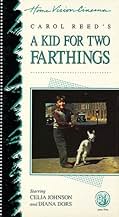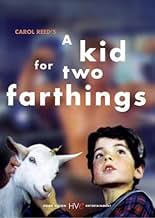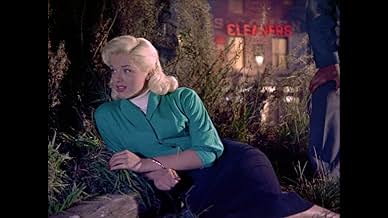IMDb RATING
6.4/10
1.2K
YOUR RATING
In London's working-class East End, a young boy is told a story by a neighbor that a unicorn can grant wishes. The hopeful boy buys a baby goat, believing it to be a real unicorn, and sets a... Read allIn London's working-class East End, a young boy is told a story by a neighbor that a unicorn can grant wishes. The hopeful boy buys a baby goat, believing it to be a real unicorn, and sets about to prove that it can bring fortune.In London's working-class East End, a young boy is told a story by a neighbor that a unicorn can grant wishes. The hopeful boy buys a baby goat, believing it to be a real unicorn, and sets about to prove that it can bring fortune.
- Awards
- 1 nomination
Brenda de Banzie
- 'Lady' Ruby
- (as Brenda De Banzie)
Bart Allison
- Auctioneer
- (uncredited)
Barbara Archer
- Madam Rita's Workroom Girl
- (uncredited)
Storyline
Did you know
- TriviaThe title, "A Kid For Two Farthings" is a play on the traditional, if optional, song which almost always concludes the Passover Seder. It's called "Chad Gad Yaw: (English approximate pronunciation of the Aramaic). It is often translated as "A Kid For Two Zuzim" (a monetary denomination for which "farthing" is an inspired translation). The events in the song are cumulative as in "The Twelve Days of Christmas", as well as something of a tongue-twister in the original. For more, see "Chad_Gadya" online for more information. At the end of the film, Mr. Kandinsky softly sings fragments of an English translation of the song.
- GoofsPython Macklin is clearly meant to be a British wrestler, yet he speaks in a foreign accent.
- Quotes
Madam Rita: You heard of Christian Dior? Well, I'm Yiddishe Dior.
- ConnectionsFeatured in Talkies: Memories of Diana Dors (2017)
Featured review
Movies titles always intrigue me, and are often the first thing that causes me to look. Long ago, when the film was released, I recall hearing about this one from my parents and, even then, I was puzzled by the title. Hence, when I had the chance to see this recently, for the first time, I was looking forward to solving my fifty-five year puzzle.
The term 'farthing' has two meanings: first, it was, at one time, an English coin of low value, equal to one-quarter of a penny; two farthings equaled a half-penny, still not much in money terms. And second, 'farthing' was generally used colloquially as anything of little value.
In the story, young Joe (Jonathan Ashmore) is on a quest to find and buy a unicorn because Mr Kadinsky (David Kossof), his friend and his mother's landlord, had told Joe that unicorns were magical creatures that could grant every wish. And young Joe very much wants to have some wishes to come about starting with seeing his father again, who is a prospector far away in South Africa. However, more pressing needs arise in Petticoat Lane of East London, the setting for this slice of London life in the fifties: Joe's adults friends, Sonia (Diana Dors) and Sam (Joe Robinson) are engaged and they need an engagement ring and other home trifles that they cannot afford to buy; Mr Kadinsky needs an automatic steam press for his shop, but can't afford the price; and Sam is a body builder but he's been encouraged pressured by Sonia, you might say to enter a wrestling match against The Python (Primo Carnera) and win some money so that he and Sonia can get married. Young Joe, naturally, wants the unicorn to make it all come true.
So, Joe begins wandering around the stalls of the market, searching, in and out, up and down, until he happens upon an old salt who has a young goat a kid - with only one horn. With the goat in tow, the old geezer is wandering around the market, trying to sell it. Joe, thinking he's found a real unicorn, sidles up and begins to bargain...
How much? he asks. The man looks at him and says, gruffly, Five bob! I'll give you three and nine, Joe responds, hopefully. The old fellow thrusts him away. Get off, I might as well skin and eat it. He looks around some more, calling out for buyers to no avail. Joe pulls all of his money out. Look, he says, I'll give you three and nine-pence ha'penny. He held out the money, together with a few worthless foreign coins. Exasperated, no other buyers on hand, the old man says, Oh, well, give me your money. He takes it roughly and stalks off, leaving Joe with the goat.
So, Joe prances off with his 'unicorn', having acquired it for only an additional half-penny - two farthings - and the old man got rid of something that was of no value to him. Puzzled solved for me, at last.
What's more surprising, however, is the fact that Carol Reed produced and directed it the director famous for The Third Man (1949), Trapeze (1956), Our Man in Havana (1959) and other dramatic goodies from the thirties and forties. Quite a departure, artistically, for Reed, yet this film works as a delightful fantasy, for young Joe, who believes that his prize possession is the reason why so many good things happen thereafter. The irony is that, in a real sense, that's true but only because his lucky pet gets caught up between Sonia, Sam and The Python.
The most I'll say about the rest of the story is that most of the wishes come true, but at a cost. The real joy in this film is seeing how it all pans out for young Joe and all the other residents of a part of London long gone but happily still living in films such as this. Having lived there myself for five years in the mid-sixties, vivid memories of that area flooded back. In that regard, I would have preferred black-and-white photography instead of the over-saturated colors of this print. But, London always looked so drab and dull in those days, so I guess that's why Reed went for color, and strong ones, all to enhance the magical quality of the setting and story.
The casting was generally very good, with the standout being David Kossof as Kadinsky; what a fine actor he was (passed away only in 2005). Young Jonathan Ashmore as Joe was well directed by Reed, showing a flair for acting (although he never appeared in another film), despite sounding very unlike any East Ender I ever heard. Ditto for his mother, Joanna (Celia Johnson), better known for appearing in weepy romances from the forties, Brief Encounter (1945) being one. Diana Dors decorated her scenes well; Joe Robinson as the body-builder performed in a wonderfully campy and narcissistic manner, a deliberate parody of the profession, I'm sure. Primo Carnera provided a great contrast to Joe in the many times they game to grips with each other. The wrestling scenes between the two are worth seeing the film just for those: bone crunching throws and tosses as only true professional fighters can do. Despite those scenes, it's still a kid's story no pun intended! The rest of the cast including Brenda de Banzie, Sid James and even Spike Milligan in a bit part all contributed in their usual fashion: flawlessly.
If you and your family are looking for a new cultural experience and an enchanting and quite funny, at times story as well, then I'd urge you to see it.
The term 'farthing' has two meanings: first, it was, at one time, an English coin of low value, equal to one-quarter of a penny; two farthings equaled a half-penny, still not much in money terms. And second, 'farthing' was generally used colloquially as anything of little value.
In the story, young Joe (Jonathan Ashmore) is on a quest to find and buy a unicorn because Mr Kadinsky (David Kossof), his friend and his mother's landlord, had told Joe that unicorns were magical creatures that could grant every wish. And young Joe very much wants to have some wishes to come about starting with seeing his father again, who is a prospector far away in South Africa. However, more pressing needs arise in Petticoat Lane of East London, the setting for this slice of London life in the fifties: Joe's adults friends, Sonia (Diana Dors) and Sam (Joe Robinson) are engaged and they need an engagement ring and other home trifles that they cannot afford to buy; Mr Kadinsky needs an automatic steam press for his shop, but can't afford the price; and Sam is a body builder but he's been encouraged pressured by Sonia, you might say to enter a wrestling match against The Python (Primo Carnera) and win some money so that he and Sonia can get married. Young Joe, naturally, wants the unicorn to make it all come true.
So, Joe begins wandering around the stalls of the market, searching, in and out, up and down, until he happens upon an old salt who has a young goat a kid - with only one horn. With the goat in tow, the old geezer is wandering around the market, trying to sell it. Joe, thinking he's found a real unicorn, sidles up and begins to bargain...
How much? he asks. The man looks at him and says, gruffly, Five bob! I'll give you three and nine, Joe responds, hopefully. The old fellow thrusts him away. Get off, I might as well skin and eat it. He looks around some more, calling out for buyers to no avail. Joe pulls all of his money out. Look, he says, I'll give you three and nine-pence ha'penny. He held out the money, together with a few worthless foreign coins. Exasperated, no other buyers on hand, the old man says, Oh, well, give me your money. He takes it roughly and stalks off, leaving Joe with the goat.
So, Joe prances off with his 'unicorn', having acquired it for only an additional half-penny - two farthings - and the old man got rid of something that was of no value to him. Puzzled solved for me, at last.
What's more surprising, however, is the fact that Carol Reed produced and directed it the director famous for The Third Man (1949), Trapeze (1956), Our Man in Havana (1959) and other dramatic goodies from the thirties and forties. Quite a departure, artistically, for Reed, yet this film works as a delightful fantasy, for young Joe, who believes that his prize possession is the reason why so many good things happen thereafter. The irony is that, in a real sense, that's true but only because his lucky pet gets caught up between Sonia, Sam and The Python.
The most I'll say about the rest of the story is that most of the wishes come true, but at a cost. The real joy in this film is seeing how it all pans out for young Joe and all the other residents of a part of London long gone but happily still living in films such as this. Having lived there myself for five years in the mid-sixties, vivid memories of that area flooded back. In that regard, I would have preferred black-and-white photography instead of the over-saturated colors of this print. But, London always looked so drab and dull in those days, so I guess that's why Reed went for color, and strong ones, all to enhance the magical quality of the setting and story.
The casting was generally very good, with the standout being David Kossof as Kadinsky; what a fine actor he was (passed away only in 2005). Young Jonathan Ashmore as Joe was well directed by Reed, showing a flair for acting (although he never appeared in another film), despite sounding very unlike any East Ender I ever heard. Ditto for his mother, Joanna (Celia Johnson), better known for appearing in weepy romances from the forties, Brief Encounter (1945) being one. Diana Dors decorated her scenes well; Joe Robinson as the body-builder performed in a wonderfully campy and narcissistic manner, a deliberate parody of the profession, I'm sure. Primo Carnera provided a great contrast to Joe in the many times they game to grips with each other. The wrestling scenes between the two are worth seeing the film just for those: bone crunching throws and tosses as only true professional fighters can do. Despite those scenes, it's still a kid's story no pun intended! The rest of the cast including Brenda de Banzie, Sid James and even Spike Milligan in a bit part all contributed in their usual fashion: flawlessly.
If you and your family are looking for a new cultural experience and an enchanting and quite funny, at times story as well, then I'd urge you to see it.
- RJBurke1942
- Jul 31, 2008
- Permalink
- How long is A Kid for Two Farthings?Powered by Alexa
Details
Box office
- Budget
- £200,000 (estimated)
- Runtime1 hour 31 minutes
- Aspect ratio
- 1.33 : 1(original ratio)
Contribute to this page
Suggest an edit or add missing content

Top Gap
By what name was A Kid for Two Farthings (1955) officially released in India in English?
Answer





























